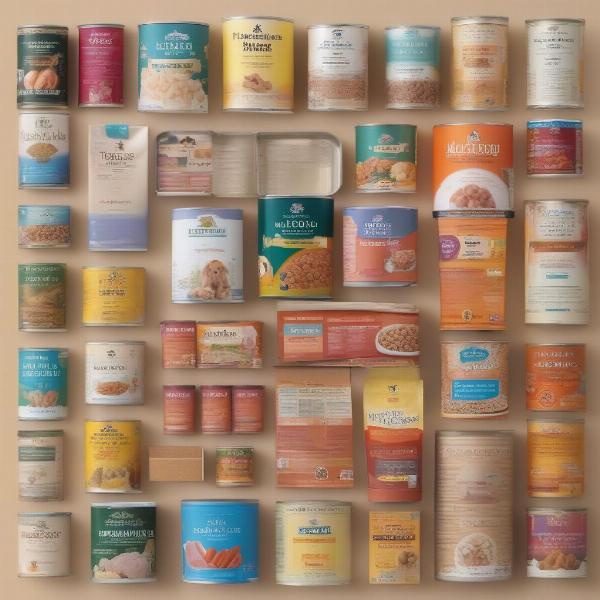Chicken fat is a common ingredient in many commercial dog foods, and it often raises questions among dog owners. Is it healthy? Is chicken fat good for dogs, or should it be avoided? The short answer is: in moderation, chicken fat can be a beneficial addition to a dog’s diet. It provides a concentrated source of energy and essential fatty acids that contribute to healthy skin and a shiny coat. However, too much chicken fat can lead to weight gain and other health problems.
Understanding the Benefits of Chicken Fat for Dogs
Chicken fat is a palatable source of energy for dogs. This is particularly beneficial for active dogs or those recovering from illness. It provides more than twice the calories per gram compared to protein or carbohydrates. Beyond energy, chicken fat is rich in linoleic acid, an omega-6 fatty acid crucial for skin and coat health. It also contributes to a dog’s immune system function and helps maintain cell structure. Furthermore, chicken fat can enhance the flavor of dog food, making it more appealing, especially for picky eaters. Finally, it can aid in the absorption of fat-soluble vitamins like A, D, E, and K.
Potential Risks of Chicken Fat in a Dog’s Diet
While chicken fat offers several benefits, excessive consumption can lead to health issues. Too much chicken fat can contribute to weight gain and obesity, increasing the risk of conditions like diabetes, heart disease, and joint problems. It can also exacerbate pancreatitis, a serious inflammation of the pancreas. Dogs with existing pancreatitis or a history of it should avoid foods high in fat, including chicken fat. Additionally, some dogs may experience digestive upset, such as diarrhea or vomiting, if they consume too much chicken fat.
How Much Chicken Fat is Safe for Dogs?
The appropriate amount of chicken fat for a dog varies depending on factors like age, activity level, breed, and overall health. Consult your veterinarian for personalized recommendations. They can help determine the ideal fat intake for your dog based on their individual needs. As a general guideline, fat should make up around 10-15% of a dog’s daily caloric intake. Remember to consider all sources of fat in their diet, including treats and table scraps.
Choosing Dog Food with Chicken Fat
 Thức ăn cho chó có mỡ gà
Thức ăn cho chó có mỡ gà
When choosing dog food containing chicken fat, opt for high-quality brands that list chicken fat as a specific ingredient. Avoid generic terms like “animal fat” as these can be less transparent about the source and quality. Check the guaranteed analysis on the label to determine the fat content. Look for foods that meet the Association of American Feed Control Officials (AAFCO) nutritional guidelines. Also, consider your dog’s specific dietary needs and sensitivities when making a choice. If you’re unsure, consult with your vet or a certified canine nutritionist for guidance.
Can Dogs Eat Cooked Chicken Skin?
While a small amount of cooked chicken skin without seasoning is generally safe for dogs, it is high in fat and should be given sparingly. It’s best to remove excess fat and skin before offering cooked chicken to your dog.
Conclusion
Chicken fat can be a healthy addition to a dog’s diet, providing essential fatty acids and a concentrated energy source. However, moderation is key. Too much chicken fat can lead to obesity and other health problems. Always consult with your veterinarian to determine the right amount of chicken fat for your dog’s individual needs. Choosing high-quality dog food with clearly labeled ingredients is crucial for maintaining your dog’s overall health and well-being. Is chicken fat good for dogs? Yes, in controlled portions!
FAQ
- Can puppies have chicken fat? Yes, but in smaller amounts than adult dogs. Consult your vet for guidance.
- What are the signs of pancreatitis in dogs? Signs include vomiting, diarrhea, lethargy, abdominal pain, and decreased appetite.
- Is chicken fat better than other animal fats for dogs? Different animal fats offer varying nutritional profiles. Chicken fat is a good source of linoleic acid.
- Can I add chicken fat to my dog’s homemade food? Yes, but consult a veterinary nutritionist to ensure a balanced diet.
- What if my dog eats too much chicken fat? Contact your veterinarian immediately if you suspect your dog has consumed excessive chicken fat.
- Are there any dog breeds prone to issues with chicken fat? Breeds prone to pancreatitis may be more sensitive to high-fat diets.
- Can I give my dog raw chicken fat? Raw chicken fat can carry bacteria and is best avoided.
wet chicken dog food
best dog food for dogs with dry skin
true food for dogs
chicken chips dog
ILM Dog, your trusted partner in canine care, provides expert advice on dog breeds, health, training, nutrition, grooming, and much more. Whether you’re a new dog owner or a seasoned expert, our resources help you navigate every aspect of dog ownership. From choosing the right breed to understanding their nutritional needs, ILM Dog is your go-to resource. Contact us for personalized support: Email: [email protected], Phone: +44 20-3965-8624. Learn more at ILM Dog.